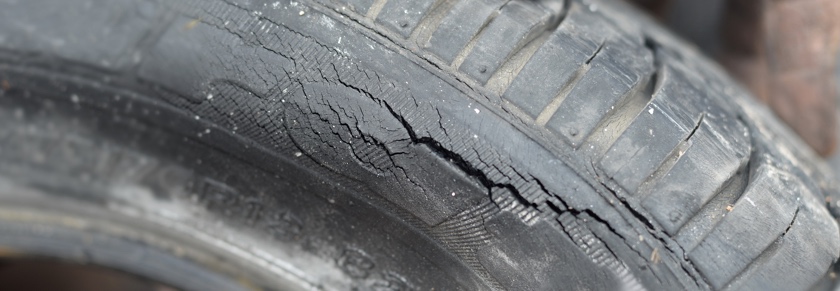Tyre Cracks – Causes & Fixes for Cracked Tyres
- Cracked tyres weaken over time, increasing blowout risk & MOT failure; it’s advised to replace them promptly.
- Common causes include natural ageing, extreme weather, incorrect tyre pressure and both overuse / underuse.
- Fixing isn’t an option; replacement is necessary for safety.
- To prevent cracking, regularly drive the car, avoid prolonged extreme weather exposure, maintain correct tyre pressure and ensure proper wheel alignment.

Cracks in car tyres will weaken their strength, performance and safety – they can even cause your vehicle to fail its MOT.
Cracked tyres are simply an unfortunate aspect of the tyre ageing process that you can’t stop completely – only delay. So how can you do this?
In this article, we’ll explore the causes of cracked tyres, along with how they can pose a risk to your car and some proactive steps you can take to slow down tyre cracking.
Are tyre cracks dangerous?
Yes, cracked car tyres are dangerous because it’s a sign that the tyre is weakening and degrading. This negatively impacts the tyre’s strength and performance, and puts them at greater risk of a blowout. Tyre cracks can appear on the sidewalls and tread. Avoid driving on cracked tyres if possible and get them replaced as soon as you can.
Will cracked tyres fail an MOT?
Cracked tyres could fail an MOT depending on how extensive the cracking is. One area that is measured during an MOT is the tyre tread depth, which should be 1.6mm minimum on the central three quarters of the tyre. Other signs of damage that are checked for include tears, bulges and cracks in the tyre. It will be up to your MOT tester to decide if the cracks are extensive enough to warrant a fail.
What causes cracked tyres?
There are multiple factors that can lead to the formation of tyre cracks. Let’s take a look at the main culprits:
- Ageing: An inevitable aspect of car ownership is the fact that parts of your vehicle will naturally age and degrade over time – including tyres. Repeated use will weaken the polymers of the tyres, leading to hardening and cracking.
- Impacts of weather: Exposure to hot and cold conditions can cause tyres to expand and contract, worsening any damage already present. UV rays can also have a negative impact on tyres, breaking down polymers and causing cracking.
- Wet conditions: The UK has a reputation for rainy weather and driving your tyres on wet surfaces can lead to a gradual decline of quality over time. This can be for a number of reasons, including water breaching the seal and damp conditions throwing the wheel out of alignment to worsen tyre wear.
- Incorrect tyre pressure: Under-inflated or over-inflated tyres can cause a lot of issues if left unaddressed, for example, cracking and bulging of the tyre.
- Lack of use: In addition to using the tyres, not using them can lead to tyres drying out and cracking too, so it’s suggested to drive your car at least once in a while.
How to fix cracked tyres
You don’t actually fix a cracked tyre, you replace it. That’s because cracks are a sign of an overall weakened structure and by that point replacement is the only real safe option. Instead, you should focus on preventing cracked tyres when you purchase your new ones to ensure your fresh wheels last for as long as possible.
How to prevent tyres from cracking
So, what steps can you take to slow down tyre cracking?
- Drive regularly: It may seem counterintuitive to use tyres regularly to prevent cracking, but vehicles left unused in a garage for many years can also result in the tyres becoming dry and brittle, leading to cracking.
- Shield from the weather: This won’t be doable for all, but protect your car tyres from exposure to UV rays by opting to storing your vehicle in the garage rather than on an open road or drive. Likewise, try not to leave your car standing in water and clean away snow or mud from the wheels to keep them in their best condition.
- Check tyre pressure: Experts recommend that motorists should check their tyre pressure around once a month. This way, you can catch developing problems early on and correct your tyre pressure accordingly.
- Check wheel alignment: If wheel alignment is not correct, this can have a big impact on tyre wear and ultimately increases the likelihood of cracking. Get your wheels realigned every couple of years or when you notice the first signs that your tyres are misaligned, with your car drifting to one side while driving.
Prevention is always better than a cure. However, all tyres will need to be replaced eventually so when the time comes, get the help of a professional tyre company to fit your next set.
Mr Tyre has 35+ autocentres across Central England, known for affordable service including MOTs, diagnostics and of course tyre replacement. Search for tyres or give your nearest Mr Tyre a call for help and advice.


